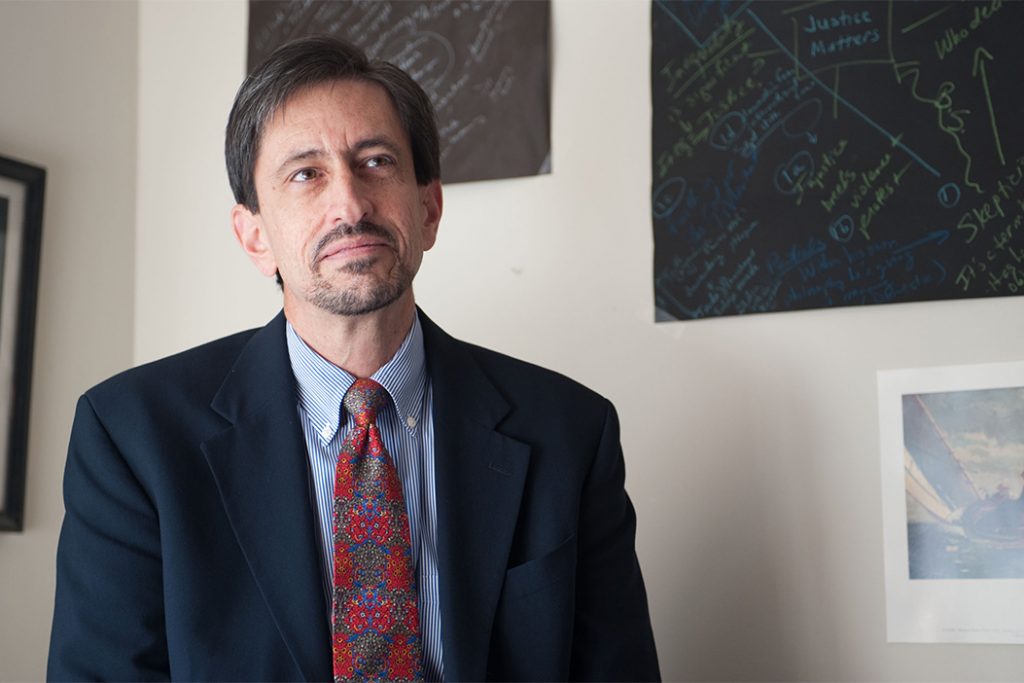Led by Professor Frank Garcia and his scholarship, a team of BC Law students made an important contribution towards international investment law reform at a recent meeting of the UN Commission on International Trade Law (UNCITRAL) in New York.
Leo Gargne LLM ’18, Tara Santosuosso ’19, Randall Scarlett ’19, and Monica Cho ’18, under the supervision of Professor Garcia (above), prepared and in April presented a series of working papers on the troubling role of third-party funding (TPF) in international investment arbitration. TPF is a rapidly expanding industry composed of speculative investors who invest in a legal claim in exchange for control of the case and a contingency in the recovery. The students’ goal was to influence states involved in the commission’s reform process to take on third-party funding as part of that effort.
The impetus for the students’ project was last October’s BC Law Investment Law Reform Conference (co-organized with the Pontifical University of Chile under a grant from the Luksic Family Fund). At the conference, concerns were raised that third-party funding in international investment arbitration was disrupting the already controversial relationship between countries and the foreign companies that set up businesses under the protection of the bilateral investment treaty (BIT) system. Critics argued that the BIT system heavily favors the corporations, undermines national sovereignty, and financially impairs the nations, many of which are still developing.
In the wake of the global financial crisis and the demand by speculative finance for new investment vehicles, third-party funding has discovered the (BIT) system and its controversial arbitration-based, investor-state dispute settlement mechanism (ISDS). The high legal costs ($8 million-$10 million, which corporate claimants would rather get off-balance sheet) and potentially high damages (an average of $300 million-$400 million) characteristic of ISDS cases have made investment arbitration a highly attractive market for third-party funding. “TPF funders are attracted to the investment arbitration system for all the wrong reasons,” Garcia notes. “Whatever the role of TPF in domestic litigation between more or less equal parties, TPF in the investment arbitration system is a perfect storm, given that states are already hard-pressed by an increasing number of one-sided claims against them.”
Here’s an example of the toll this can take on states. In a Transnational Institute article, Cecilia Olivet wrote that in 2012 an investment arbitration tribunal ordered Ecuador, which had a number of BIT treaties, to pay $2.3 billion to US oil company Occidental after Ecuador terminated its oil concession when it learned that the company sold 40 percent of its production rights to another investor without government approval. The sum represented 59 percent of the country’s 2012 annual education budget and 135 percent of it’s annual healthcare budget.
Stunned by the outcome, Ecuador set up a commission to investigate the tribunal’s decision in this case and in others it had been party to. Among its findings were that investors disproportionately benefited when suing Ecuador using bilateral investment treaties and that the arbitrators deciding cases against Ecuador could not be considered impartial, Olivet said.
Under the current BIT/ISDS system, states have no counter-claim rights at all, parties choose arbitrators from a small band of elite investment lawyers, there are no appeal rights, and enforcement is mandatory.
TPF in the investment arbitration system is a perfect storm, given that states are already hard-pressed by an increasing number of one-sided claims against them.
“The legal regime that third-party funding relies upon yields spectacular returns on investment. TPF investors can count on states settling or losing two-thirds of the time, and potential returns on investment as high as 700 percent.” —Professor Frank Garcia
All they risk are the litigation costs, which they spread through a portfolio investment model. In the words of one critic, it is the gambler’s paradise: heads I win, tails I do not lose.
These returns come at the cost of developing countries, often deliberately targeted by TPF funders, and their taxpayers, who ultimately bear the burden of these awards that principally benefit speculative financiers.
For the New York meetings of the UNCITRAL Rules Reform Working Group last spring, BC Law worked closely with investment reform lawyers at the Columbia Center on Sustainable Investment, which is also deeply engaged in the fight against TPF.
Following a public stakeholder session at which the BC Law team presented its findings, and a subsequent working lunch with interested states, a stream of reports from the Columbia attorneys observing the afternoon sessions documented the momentum building towards addressing TPF as part of the commission’s rules reform process.
State after state stood up and publicly called for either a total ban, more stringent regulation, or at least further research on the effects of third-party funding, many citing the value of the BC Law working papers. Several states formally requested that the UNCITRAL Secretariat produce a policy options paper on third-party funding for the next meeting in the process.
In perhaps the most exciting development, when one state called for a pro-TPF industry report to be included on the secretariat’s website, other states immediately demanded that the BC Law research then be posted on the UNCITRAL website as well.
Finally, in a parallel proceeding, another NGO that attended the stakeholder session promised to contribute its own critique of TPF, using the BC Law team’s work, into the EU’s public deliberation process over its proposed Multilateral Investment Court.
“It was a rewarding moment for BC Law,” said Professor Garcia, “and demonstrated the power of students to advance a process that we all hope will lead to fairer rules for the states and stakeholders involved.”
Read additional analysis of TPF by Frank Garcia in Investment Treaty News and a December 2018 article about TPFs by Reuters.


